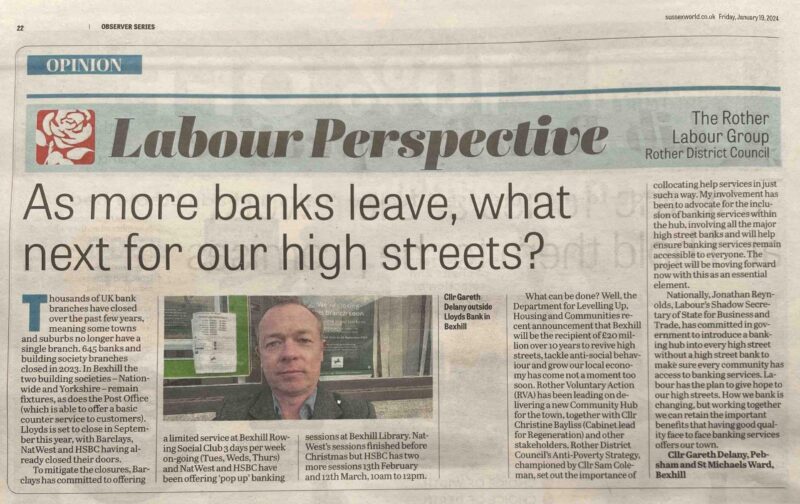Bexhill and Battle Labour Party
(Full unedited text)
Thousands of UK bank branches have closed over the past few years, meaning some towns and suburbs no longer have a single branch. 645 banks and building society branches closed in 2023. In Bexhill the two building societies – Nationwide and Yorkshire – remain fixtures, as does the Post Office (which is able to offer a basic counter service to customers). However, the last of the ‘big 4’ high street banks, Lloyds, is set to close in September later this year, with Barclays, NatWest and HSBC having already closed their doors.
To mitigate the closures, Barclays has committed to offering a limited service at Bexhill Rowing Social Club 3 days per week on-going (Tues, Weds, Thurs) and NatWest and HSBC have been offering ‘pop up’ banking sessions at Bexhill Library. NatWest’s sessions finished before Christmas but HSBC has two more session 13th February and 12th March, 10am to 12pm.
I understand the argument from the banks, that customers have increasingly shifted to mobile and online banking, and certainly footfall in our banks had dropped significantly. However, I am concerned about the impact the lack of banks will have on elderly and vulnerable people, who rely on in-person banking services and may struggle to access alternative options online. But this is not just about the elderly, recent research from KPMG has indicated that cost of living pressures are pushing up the number of working-age customers relying on bank branches to help them manage their squeezed budgets – often because they want to speak to a real person about their finances.
The Chamber of Commerce too has rightly been raising the absence of banking services available to our local businesses as well as the issue of the empty premises the banks leave behind on our shopping streets. Local businesses also benefitted from customers coming into town to go to their bank and then having a walk around, visiting and spending in other shops and cafes. This is all lost trade in the current circumstances.
What can be done? Well, the Department for Levelling Up, Housing and Communities recent announcement that Bexhill will be the recipient of £20 million over 10 years to revive high streets, tackle anti-social behaviour and grow our local economy has come not a moment too soon. Rother Voluntary Action (RVA) has been leading on delivering a new Community Hub for the town, together Cllr Christine Bayliss (Cabinet lead for Regeneration) and other stakeholders. Rother District Council’s Anti-Poverty Strategy, championed by Cllr Sam Coleman, set out the importance of collocating help services in just such a way. My involvement has been to advocate for the inclusion of banking services within the hub, involving all the major high street banks and will help ensure banking services remain accessible to everyone. The project will be moving forward now with this as an essential element. It is early days for the project, but already potential premises are already being identified. Further updates will be forthcoming over the coming months.
Nationally, Jonathan Reynolds, Labour’s Shadow Secretary of State for Business and Trade, has committed in government to introduce a banking hub into every high street without a high street bank to make sure every community has access to banking services. Labour has the plan to give hope to our high streets. How we bank is changing, but working together we can retain the important social and economic benefits that having good quality face to face banking services offers our town.

